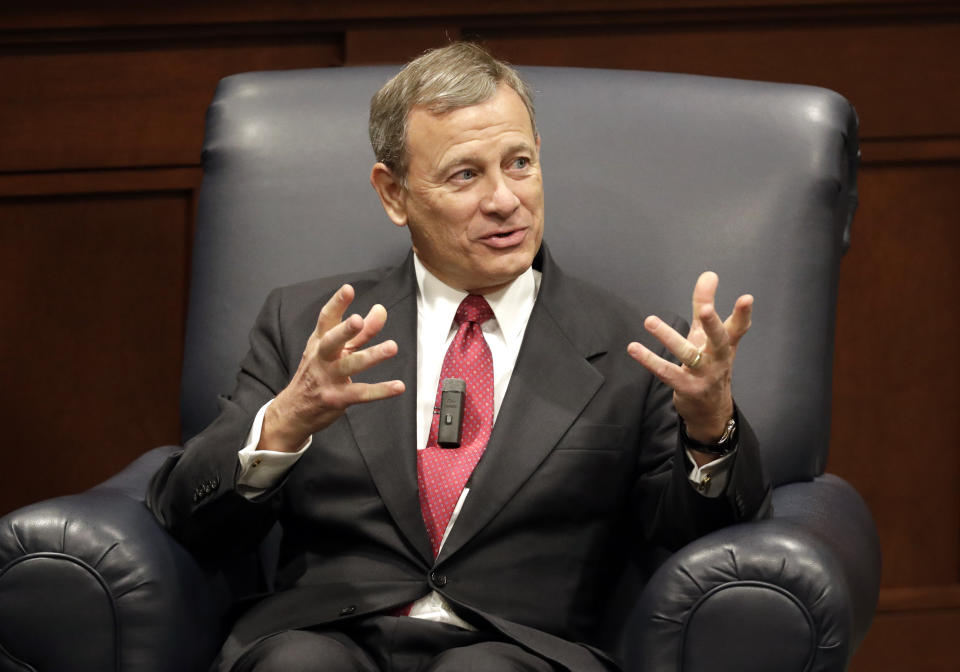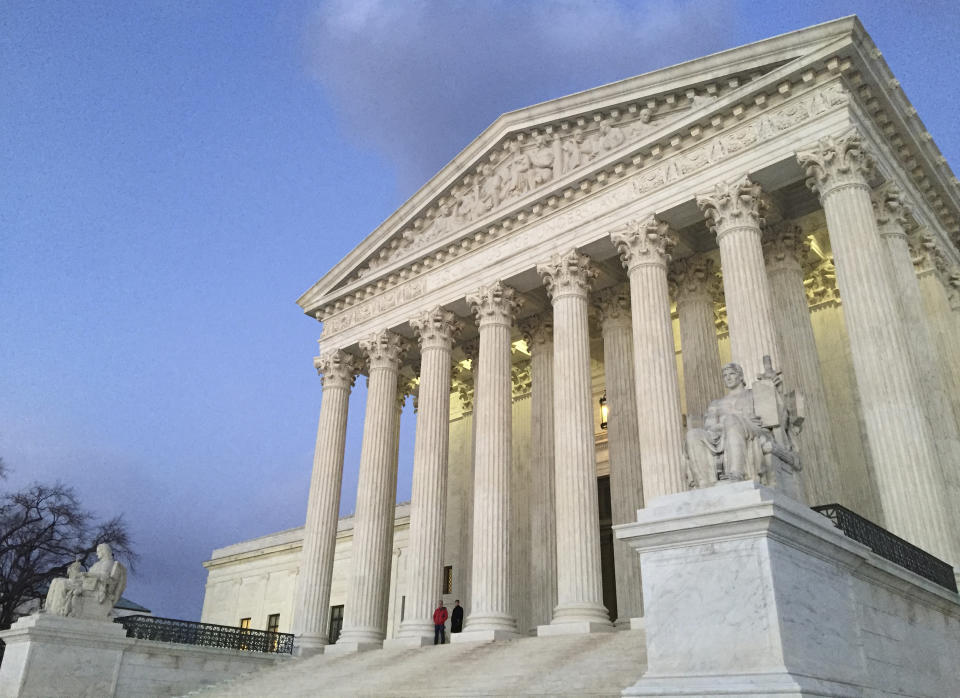Abortion case shows Roberts firmly at Supreme Court's center
Chief Justice John Roberts broke with the Supreme Court's other conservative justices and his own voting record on abortion to block a Louisiana law requiring abortion providers to have admitting privileges at a nearby hospital.
Roberts didn't explain his decision late Thursday to join the court's four liberal justices. But it was the clearest sign yet of the role Roberts intends to play as he guides a more conservative court with two new members appointed by President Donald Trump.
Since the retirement of Justice Anthony Kennedy last summer, Roberts has become the court's new swing vote. He is, by most measures, a very conservative justice, but he seems determined to keep the court from moving too far right too fast and being perceived as just another forum for partisan politics in Washington.
"People need to know that we're not doing politics. They need to know that we're doing something different, that we're applying the law," Roberts said during an appearance this week at Tennessee's Belmont University.
Roberts' vote in the Louisiana case was the fourth time in recent weeks that he has held the decisive vote on 5-4 outcomes that otherwise split the court's conservative and liberal justices.
In late December, Roberts joined the liberals to keep Trump's new asylum policy from taking effect. It would have prevented immigrants from making asylum claims if they didn't enter the United States at a border crossing. Then, in January, Roberts voted with the conservatives to allow restrictions on military service by transgender individuals to be put in place.
On Thursday, a half hour before the court acted on the Louisiana law, Roberts voted with the conservatives to deny a Muslim death row inmate's plea to have his imam with him for his execution in Alabama. The federal appeals court in Atlanta had ordered the execution halted, but the Supreme Court lifted the hold and allowed it to proceed.
The final vote was the order to keep Louisiana's admitting privileges law on hold while the court decides whether to add the case to its calendar for the term that begins in October. Louisiana's law is strikingly similar to a Texas measure the justices struck down in 2016.
A district court judge had struck down the Louisiana law because he found it would have resulted in the closure of at least one, and perhaps two, of the state's three abortion clinics, and left the state with no more than two doctors who could meet the law's requirements. But the federal appeals court in New Orleans upheld the law, concluding it was not certain that any clinic would have to close.
So much of what the court has done in recent weeks has been through emergency appeals, cases that call for temporary, yet often revealing, votes. Unlike in cases that are argued and decided, the votes come with little explanation. When there is an opinion, it usually is a dissent.
Justice Brett Kavanaugh wrote the only dissent in the Louisiana case, arguing that the court should have allowed the law to take effect because it is not clear that doctors would have been unable to obtain hospital privileges during a 45-day transition period.
After the ruling, some Democrats seized on Kavanaugh's vote as proof that he was not following through on his assurances at his confirmation hearing to respect past Supreme Court decisions on abortion. But in his dissent he said otherwise. Kavanaugh acknowledged that the court's decision in the Texas case is the guiding precedent and seemed to suggest he might be willing to vote the other way if it turned out that hospitals were unwilling to afford the doctors admitting privileges.
The Louisiana clinics had argued that they would have been forced to stop performing abortions immediately and that clinics, once closed, are difficult to reopen.
Kavanaugh and Justice Neil Gorsuch, Trump's two high-court appointees, are among six Trump-nominated judges who voted to let the law take effect, a sign that the president is carrying through on a campaign pledge to put abortion-rights opponents on the bench. The other four judges are members of the New Orleans-based 5th U.S. Circuit Court of Appeals, which had refused to put the law on hold.
The execution aside, the recent votes are not likely to be the court's last word on asylum, military service by transgender people or the abortion clinic legislation. A decision on whether the high court will take on the abortion clinic legislation could come this spring. If it does, as seems likely, a ruling on the constitutionality of the Louisiana law would likely come next year. There's no guarantee that Roberts will be with his liberal colleagues then.
In 2007, Roberts voted to uphold a federal ban on an abortion method its opponents call partial-birth abortion. Three years ago, Roberts was in dissent when the court struck down a Texas law that is strikingly similar to the blocked Louisiana measure.
Justices often feel bound by a prior decision of the court, even one they disagree with, at least until the court formally takes on a case to consider overruling the earlier decision.
If he ends up voting to invalidate the Louisiana law, Roberts wouldn't be the first chief justice to put institutional concerns above his own views. Chief Justice William Rehnquist had been a fierce critic of the Supreme Court decision that requires police officers to advise arrestees of their Miranda rights to remain silent and have a lawyer represent them. Yet, in 2000, he was the author of a 7-2 decision that reaffirmed the Miranda case.
There are few high-profile cases on the court's docket this year, seemingly by design, after Kavanaugh's tumultuous confirmation hearings. In March, the justices will consider whether to impose limits on drawing electoral districts for partisan political gain. They also could hear arguments this spring on another controversial Trump administration initiative, to add a question on citizenship to the 2020 census.
Already on the calendar for next term is the court's first examination of gun rights in nine years. That decision, as well as the Louisiana case, could come in the spring of 2020, fodder for a presidential campaign in which the court could play an outsized role.
___
Associated Press writer Jessica Gresko contributed to this report.

